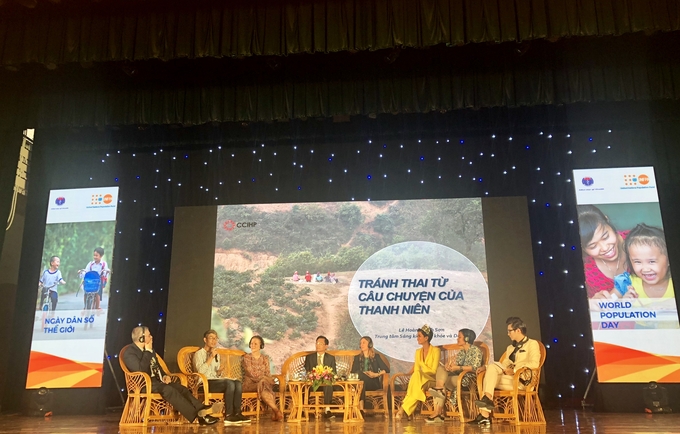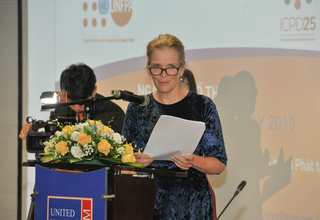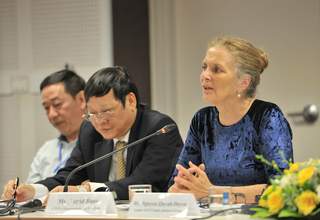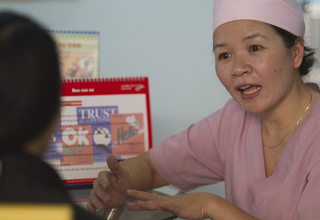World Population Day 2018 seeks to accelerate action to strengthen universal access to family planning in Viet Nam and across Asia-Pacific
HA NOI, VIET NAM, July 11, 2018 - The Health Minister of Viet Nam, civil society organisations and the United Nations Population Fund (UNFPA) in Asia and the Pacific are reaffirming their commitment and support on World Population Day to ensuring universal access to family planning, leaving no one behind.
This year the UNFPA regional World Population Day event took place at the Viet Nam Youth Academy in Ha Noi, before an audience that included hundreds of young persons for whom this issue has special relevance as they embark upon adulthood, with the prospect of starting their own families in the not too distant future.
Panelists from the Viet Nam Ministry of Health, the UNFPA Asia-Pacific Regional Office and Viet Nam Country Office, the International Planned Parenthood Federation (IPPF) and youth activists discussed progress as well as challenges both in Viet Nam and across Asia-Pacific in advocating for and implementing crucial services and information related to sexual and reproductive health and reproductive rights, including family planning.
This year marks the 50th anniversary of the 1968 International Conference on Human Rights, where family planning was, for the first time, affirmed as a right for all. The Tehran Proclamation states that "Parents have a basic human right to determine freely and responsibly the number and spacing of their children."
This was further enshrined in the Programme of Action stemming from the 1994 International Conference on Population and Development (ICPD), which serves as the foundation for much of the work UNFPA does in Asia-Pacific and around the world.
Looking forward, achieving the world’s Sustainable Development Goals (SDGs) by 2030 will depend significantly on how well the sexual and reproductive health and rights of women and young people are fulfilled. Addressing unmet need for family planning is among the most cost-effective investments countries can make.
“For the first time in history, nearly 700 million women and adolescent girls in developing countries now use modern contraceptives, the best means of exercising the right to determine the number and spacing of one’s children,” noted Bjorn Andersson, UNFPA Regional Director for Asia and the Pacific. “In Viet Nam and across our region, we’ve seen truly impressive improvements in sexual and reproductive health and rights. Yet despite the huge progress, there are still 140 million women across Asia-Pacific with an unmet need for family planning, with over 70 million women living in South Asia alone.”
Family planning in Viet Nam
Viet Nam has made huge strides in ensuring access to family planning. Ongoing investment has ensured that contraceptives, services and information are available to virtually the entire nation. As a result, the rate of modern contraceptive use rose from 37 per cent in 1988 to 67 per cent in 2016.
Related to this, Viet Nam’s maternal mortality rate dropped significantly from 233 deaths per 100,000 live births in the 1990s to 58 per 100,000 live births in 2016. The nation’s fertility rate also dropped by more than half, from an average of 5 children per couple in the 1970s to the replacement rate of 2.09 in 2006.
Addressing the event, Viet Nam Vice Minister of Health Pham Le Tuan said “All these results of population and family planning work have contributed significantly to our socio-economic development, especially towards poverty reduction, social protection, health care and the successful implementation of the Millennium Development Goals - setting a strong foundation for the Sustainable Development Goals. We can truly say that family planning investments have yielded savings in state spending on social services and an increase of 2 per cent of GDP per capita.”
Yet challenges remain. Amongst young unmarried people, the need for modern contraceptives is as high as 30 per cent. Gaps also persist in the provision of adolescent sexual and reproductive health information and services, including ensuring access to quality comprehensive sexuality education.
Bridging these gaps for the entire population, including ethnic minorities and people living in remote areas, will help each person fulfill their potential. Investing in young people's health and development will also help the country to reap significant long-term socio-economic gains.
The gender dimensions of family planning
“Gender equality plays a crucial role in family planning: access to family planning - and the right to choose the number timing and spacing of our children is key to achieving women’s rights,” said Ingrid Fitzgerald, Gender and Human Rights Adviser, UNFPA Asia-Pacific.
“Ensuring women and girls have the right to choose if and when to marry and if and when to have children is fundamental to achieving sexual and reproductive health and rights, and making family planning a success. When women’s rights to make these choices are curtailed, as is the case in far too many places today, it constrains women and girl’s ability to achieve their full potential, access opportunities for education and employment, and participate fully in their societies and economies. This is not only harmful for individual women, but also entire families and in fact all of society. Genuine gender equality simply cannot be achieved without realising women’s sexual and reproductive health and rights.”
“Ultimately, providing voluntary family planning services, including information, counselling and contraceptives, is one of the most cost-effective public health interventions that money can buy, contributing directly to dramatic reductions in maternal mortality and morbidity and ensuring individuals, communities and nations can make the best of themselves,” said Bjorn Andersson.
UNFPA is fully committed to supporting governments and people across Asia-Pacific and globally to ensure that universal access to health, including sexual and reproductive health, will become a reality for all. This is clear from UNFPA’s new Strategic Plan 2018-2021, with Three Transformational Results or the ‘Three Zeroes’, which demonstrate the linkages between family planning and wider health and well-being.
“Together, we can build a future where zero is the only acceptable number: zero maternal deaths, zero unmet demand for family planning, and zero violence and harmful practices against women and girls,” concluded Astrid Bant, UNFPA Representative in Viet Nam. “A future in which we fulfill the hopes and dreams for millions in Asia and the Pacific, including Viet Nam, in alignment with the central pledge of the 2030 Sustainable Development Agenda and its SDGs -- to ensure that absolutely no one is left behind.”
------
For more information, or to arrange media interviews, please contact:
Roy Wadia / UNFPA Asia-Pacific (Bangkok) : wadia@unfpa.org / +66 848 752 634
Matthew Taylor / UNFPA Asia-Pacific (Bangkok) : taylor@unfpa.org / +66 2 844 382 815
Nguyen Thi Hong Thanh / UNFPA Viet Nam (Ha Noi) : tnguyen@unfpa.org / +84 91 309 3363




